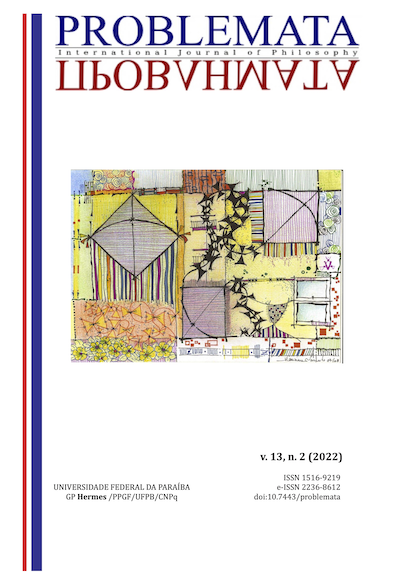I-SEMANTICS:
DENOTATIONAL APPROACH
DOI:
https://doi.org/10.7443/problemata.v13i2.61727Keywords:
Philosophy of Language, Formal Semantics, Philosophy of LinguisticsAbstract
Larson & Segal (L&S) defend the thesis that semantics should be seen as a branch of cognitive psychology. They seek to insert their proposal within the generative program, borrowing not only the formal resources developed by the generative grammarians, but also the conceptual assumptions that guide this program. In this article, I expose the object of study of I-semantics (Internal, intentional and individual semantics) as proposed by L&S. In this article, I argue that there is a tension between the type of internalism proposed by L&S and the core of the generative program. If the L & S proposal is incorporated into the generative program, it will be necessary to modify the latter, to add new premises that are inconsistent with its core of its theoretical assumptions. This problem can be diagnosed from a distinction between the Interpretive Problem (PI) and the Combinatorial Problem (PC). We will see that the generative program provides an empirical contribution to the solution of the first problem, but not the second. However, for L&S, these are and one and the same problem.
Downloads
References
CHOMSKY, Noam. Syntactic Structures. The Hague: Mouton, 1957.
CHOMSKY, Noam. Review of Verbal Behavior, by B.F. Skinner. Language 35, 1, 1959, p. 26-57.
CHOMSKY, Noam. Aspects of the Theory of Syntax. Cambridge: M.I.T., 1965.
CHOMSKY, Noam. Quine's Empirical Assumptions. Synthese 19.1-2, 1968, p.53-68.
CHOMSKY, Noam. Linguística Cartesiana. Petrópolis: Vozes, 1972a.
CHOMSKY, Noam. Studies on Semantics in Generative Grammar. The Hague: Mouton, 1972b.
CHOMSKY, Noam. The Logical Structure of Linguistic Theory. New York: Plenum, 1975.
CHOMSKY, Noam. Essays on Form and Interpretation. New York: North-Holland, 1977.
CHOMSKY, Noam. Reflexões sobre a Linguagem. São Paulo: Cultrix, 1980a.
CHOMSKY, Noam. Rules and Representations. New York: Columbia University Press, 1980b.
CHOMSKY, Noam. Lectures on Government and Binding. Dordrecht, Holland: Foris Publications, 1981.
CHOMSKY, Noam. The Generative Enterprise. Dordrecht: Foris Publications, 1982.
CHOMSKY, Noam. O Conhecimento da Língua: Sua Natureza, Origem e Uso. Lisboa, Editora Caminho, 1994.
CHOMSKY, Noam. O Programa Minimalista. Lisboa: Caminho, 1995.
CHOMSKY, Noam. Linguagem e Mente. Brasília: Editora UNESP, 1996.
CHOMSKY, Noam. New Horizons in the Study of Language and Mind. Cambridge: Cambridge University Press, 2000.
CHOMSKY, Noam.Language and Problems of Knowledge: The Managua Lectures. Massachusetts: MIT, 2001.
CHOMSKY, Noam. Reply to Ludlow. In: ANTONY, L. & HORNSTEIN, N. (eds.). Chomsky and his Critics. Malden, MA: Blackwell Pub., 2003.
LARSON, Richard. Semantics. In: GLEITMAN, L.(ed.). Invitation to Cognitive Science. Vol. 1. Language. Cambridge: MIT Press., 1995, cap.12.
LARSON, Richard & SEGAL, Gabriel. Knowledge of Meaning: an Introduction to Semantic Theory. Cambridge: MIT Press, 1995.
PUTNAM, Hilary. Meaning and Reference. Journal of Philosophy 70, 1973, 699-711.
Downloads
Published
Issue
Section
License
Copyright (c) 2022 Adriano Marques Silva

This work is licensed under a Creative Commons Attribution 4.0 International License.
Authors who publish with this journal agree to the following terms:
- Authors retain copyright and grant the journal right of first publication with the work simultaneously licensed under a Creative Commons Attribution License that allows others to share the work with an acknowledgement of the work's authorship and initial publication in this journal.
- Authors are able to enter into separate, additional contractual arrangements for the non-exclusive distribution of the journal's published version of the work (e.g., post it to an institutional repository or publish it in a book), with an acknowledgement of its initial publication in this journal.
-
- Authors are permitted and encouraged to post their work online (e.g., in institutional repositories or on their website) prior to and during the submission process, as it can lead to productive exchanges, as well as earlier and greater citation of published work (See The Effect of Open Access).





